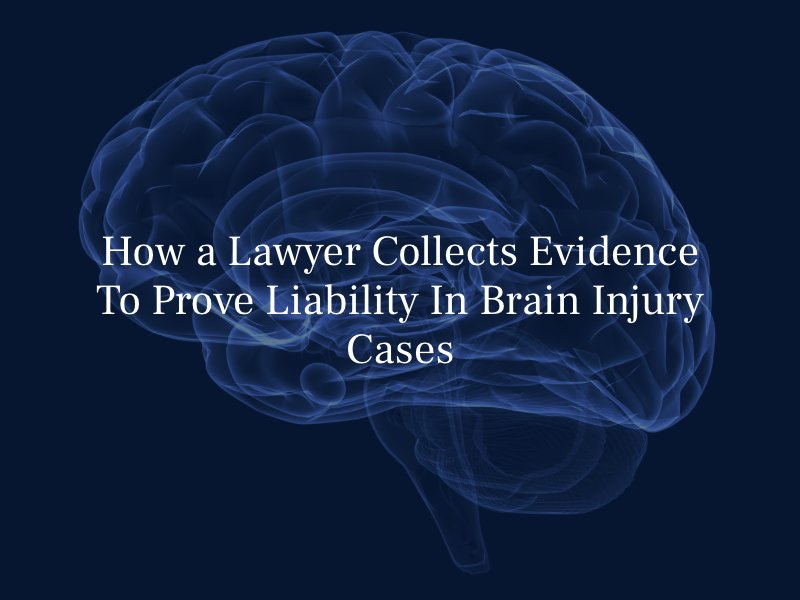How Does a Lawyer Collect Evidence To Prove Liability In Brain Injury Cases?
October 31, 2022 Posted In Brain Injuries
Recovering fair compensation in a brain injury case requires proving that another party’s negligence was to blame for your harm. To ensure your success, a Riverside Traumatic Brain Injury Attorney will build your case by thoroughly investigating your accident and collecting critical evidence.

Collect Documentation
A brain injury lawyer will ensure all physical evidence is collected that is needed to support your case. For example by:
- Sending out trained investigators to the scene of the incident which caused your brain injury;
- Taking pictures of the scene where you were injured and the area surrounding it;
- Searching for available surveillance footage of the incident;
- Reviewing traffic camera recordings (if applicable, e.g., car accident cases);
- Obtaining a copy of the police report, which insurance companies often use in their decision on fault.
- Collecting black box data if applicable (e.g., commercial truck accidents). They can provide valuable information on the vehicle and the events leading up to a collision, such as its speed, braking, and steering;
- Ensuring you receive proper medical care and follow-up treatment;
- Obtaining copies and reviewing all medical records. Medical records must link your brain injury to the incident caused by the at-fault party.
- Hiring a medical expert to give testimony regarding the severity of your brain injury, the prognosis, and the daily and long-term impact;
- Gathering pay stubs, tax returns, and other proof of lost income;
- Subpoenaing the at-fault party’s cell phone records if necessary;
This list is not exhaustive, but an attorney will begin building your case with physical evidence as soon as possible since it can quickly be lost or destroyed, and witnesses’ memories will fade.
Interview Witnesses
If anyone witnessed your brain injury accident, your attorney will seek them out to get their statement. Witnesses can offer an objective point of view on how your injury occurred and who was at fault. In addition, since they have no financial stake in your claim, their opinion can be vital to an insurance company’s decision on liability.
Hire Experts
Hiring expert witnesses in a brain injury case is typically crucial to success. Some examples include:
- Neurologist or Neuropsychologist: They can give testimony about the nature and extent of your injury, cognitive impairments, the type of treatment you require, and its long-term impact on your life.
- Psychologist: A psychologist can give testimony about your emotional state. For instance, how you are adapting to a dramatically changed lifestyle and whether you suffer from any psychological conditions (e.g., depression, anxiety, PTSD, etc.).
- Vocational Expert: Testimony as to your need to retrain for a new type of employment.
- Accident Reconstructionist: If your case involves a car accident, an accident reconstruction expert can analyze the collision to determine the cause of the accident and apply principles of physics and engineering to identify contributing factors to your brain injury.
How Evidence is Used to Prove Liability
To prove another party was negligent involves demonstrating the following four elements:
Duty of Care
The defendant (at-fault party) owed the plaintiff (victim) a duty of care. For example, suppose your brain injury case involves medical malpractice. Doctors owe patients a high duty of care to extend the same reasonable care that another physician in the same field would provide. As a result, establishing a doctor owed you a duty of care simply requires proving your relationship, which can be done with medical records.
Breach of Duty
The defendant breached their duty of care by failing to act as another reasonable person would in a similar situation. Using the same medical malpractice case example, proving a breach of care by a physician may require medical records, witness statements, and medical expert testimony about the standard of care expected and how it was deviated from.
Causation
The defendant’s actions directly led to the plaintiff’s harm. In other words, you would not have been injured but for the defendant’s behavior. For example, had your anesthesiologist properly monitored you while under anesthesia, your brain would not have been deprived of blood flow resulting in damage. Evidence of causation could be medical records related to the surgery, your brain injury afterward, follow-up care, eyewitness accounts, expert testimony, etc.
Damages
The plaintiff suffered damages as a result of the defendant’s negligence. If you do not suffer any financial or personal losses for which you deserve reimbursement, then there is no case. Evidence of damages includes, for instance, medical bills, pay stubs showing lost income, testimony on the extent of your brain injury and your pain and suffering, etc.
Holding another party responsible in a brain injury case can be complex. A San Bernardino Traumatic Brain Injury Attorney can help ensure you recover the compensation you deserve.